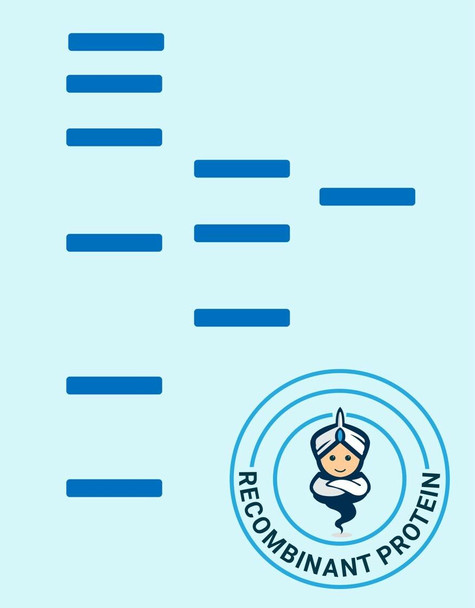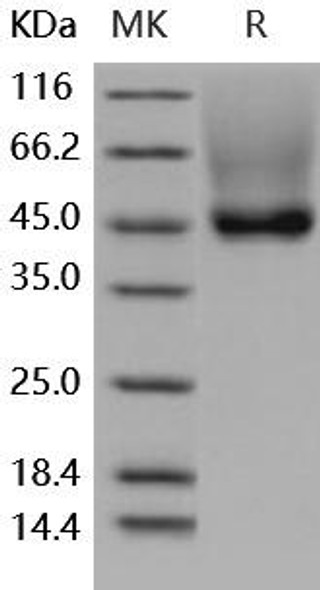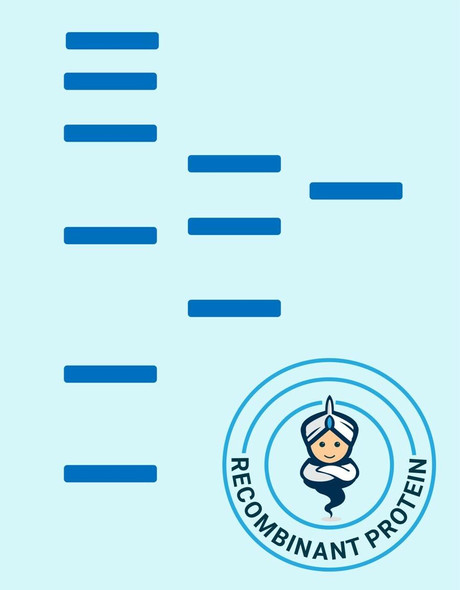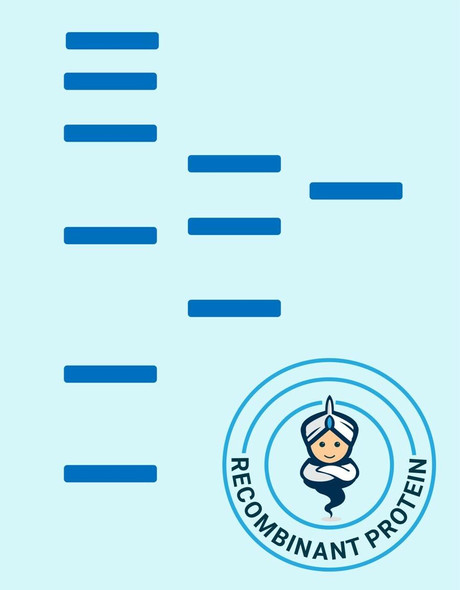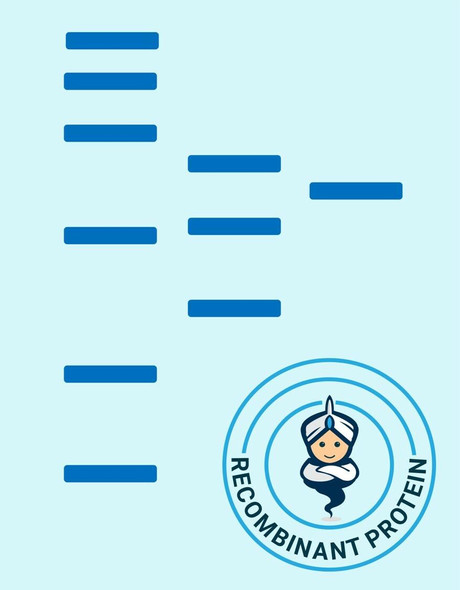Human DCN Recombinant Protein (RPPB3334)
- SKU:
- RPPB3334
- Product Type:
- Recombinant Protein
- Species:
- Human
- Uniprot:
- P07585
Description
| Product Name: | Human DCN Recombinant Protein |
| Product Code: | RPPB3334 |
| Size: | 10µg |
| Species: | Human |
| Target: | DCN |
| Synonyms: | Decorin, Decorin Proteoglycan, Bone Proteoglycan II, SLRR1B,PG-S2, CSCD, PG40,Dermatan Sulphate Proteoglycans II, Small Leucine-RichProtein 1B, Proteoglycan Core Protein, DSPG2, PGII, PGS2, Decorin, Boneproteoglycan II, PG-S2, , PG40. |
| Source: | Sf9 Insect cells |
| Physical Appearance: | Sterile filtered colorless solution. |
| Formulation: | DCN protein solution (1mg/ml) contains Phosphate BufferedSaline (pH 7.4) and 10% glycerol. |
| Stability: | Store at 4°C if entire vial will be used within 2-4 weeks.�Store, frozen at -20°C for longer periods of time. For long term storage it is recommended to add a carrier protein (0.1% HSA or BSA).Avoid multiple freeze-thaw cycles. |
| Purity: | Greater than 95% as determined by SDS-PAGE. |
| Amino Acid Sequence: | DEASGIGPEV PDDRDFEPSL GPVCPFRCQC HLRVVQCSDL GLDKVPKDLPPDTTLLDLQN NKITEIKDGD FKNLKNLHAL ILVNNKISKV SPGAFTPLVK LERLYLSKNQ LKELPEKMPKTLQELRAHEN EITKVRKVTF NGLNQMIVIE LGTNPLKSSG IENGAFQGMK KLSYIRIADTNITSIPQGLP PSLTELHLDG NKISRVDAAS LKGLNNLAKL GLSFNSISAVDNGSLANTPH LRELHLDNNK LTRVPGGLAE HKYIQVVYLH NNNISVVGSS DFCPPGHNTK KASYSGVSLFSNPVQYWEIQ PSTFRCVYVR SAIQLGNYKH HHHHH |
Decorin (DCN) is a small cellular or pericellular matrix proteoglycan which is closely related in structure to biglycan protein. Decorin is a secreted protein which binds to collagen and fibronectin in extracellular matrix. Decorin appears in different glycoforms, substituted with chondroitin sulfate or dermatan sulfate consistent with the original tissue. DCN contains one attached glycosaminoglycan chain. Decorin influences the rate of fibril formation. Decorin is capable of suppressing the growth of various tumor cell lines. DCN gene defects cause corneal dystrophy. The DCN gene is a candidate gene for Marfan syndrome.
DCN produced in Sf9 Baculovirus cells is a single,glycosylated polypeptide chain containing 335 amino acids (31-359a.a.) andhaving a molecular mass of 37.1kDa.�(Molecular size on SDS-PAGE will appear atapproximately 40-57kDa).DCN is expressed with a 6 amino acid His tag atC-Terminus and purified by proprietary chromatographic techniques.
| UniProt Protein Function: | DCN: May affect the rate of fibrils formation. Defects in DCN are the cause of congenital stromal corneal dystrophy (CSCD). Corneal dystrophies are inherited, bilateral, primary alterations of the cornea that are not associated with prior inflammation or secondary to systemic disease. Most show autosomal dominant inheritance. Belongs to the small leucine-rich proteoglycan (SLRP) family. SLRP class I subfamily. 5 isoforms of the human protein are produced by alternative splicing. |
| UniProt Protein Details: | Protein type:Secreted, signal peptide; Extracellular matrix; Secreted; Motility/polarity/chemotaxis Chromosomal Location of Human Ortholog: 12q21.33 Cellular Component: extracellular matrix; lysosomal lumen; proteinaceous extracellular matrix; extracellular space; Golgi lumen; extracellular region; collagen type VI Molecular Function:collagen binding; glycosaminoglycan binding; extracellular matrix binding; protein N-terminus binding Biological Process: extracellular matrix organization and biogenesis; skeletal muscle development; chondroitin sulfate biosynthetic process; glycosaminoglycan metabolic process; wound healing; response to lipopolysaccharide; pathogenesis; dermatan sulfate biosynthetic process; chondroitin sulfate metabolic process; extracellular matrix disassembly; organ morphogenesis; response to mechanical stimulus; chondroitin sulfate catabolic process; carbohydrate metabolic process; kidney development; peptide cross-linking via chondroitin 4-sulfate glycosaminoglycan; aging; placenta development Disease: Corneal Dystrophy, Congenital Stromal |
| NCBI Summary: | The protein encoded by this gene is a small cellular or pericellular matrix proteoglycan that is closely related in structure to biglycan protein. The encoded protein and biglycan are thought to be the result of a gene duplication. This protein is a component of connective tissue, binds to type I collagen fibrils, and plays a role in matrix assembly. It contains one attached glycosaminoglycan chain. This protein is capable of suppressing the growth of various tumor cell lines. There are multiple alternatively spliced transcript variants known for this gene. This gene is a candidate gene for Marfan syndrome. [provided by RefSeq, Jul 2008] |
| UniProt Code: | P07585 |
| NCBI GenInfo Identifier: | 129951 |
| NCBI Gene ID: | 1634 |
| NCBI Accession: | P07585.1 |
| UniProt Secondary Accession: | P07585,Q9P0Z0, Q9P0Z1, Q9Y5N8, Q9Y5N9, |
| UniProt Related Accession: | P07585 |
| Molecular Weight: | 8,266 Da |
| NCBI Full Name: | Decorin |
| NCBI Synonym Full Names: | decorin |
| NCBI Official Symbol: | DCN�� |
| NCBI Official Synonym Symbols: | CSCD; PG40; PGII; PGS2; DSPG2; SLRR1B�� |
| NCBI Protein Information: | decorin; PG-S2; bone proteoglycan II; decorin proteoglycan; proteoglycan core protein; small leucine-rich protein 1B; dermatan sulphate proteoglycans II |
| UniProt Protein Name: | Decorin |
| UniProt Synonym Protein Names: | Bone proteoglycan II; PG-S2; PG40 |
| Protein Family: | Decorin |
| UniProt Gene Name: | DCN�� |
| UniProt Entry Name: | PGS2_HUMAN |

